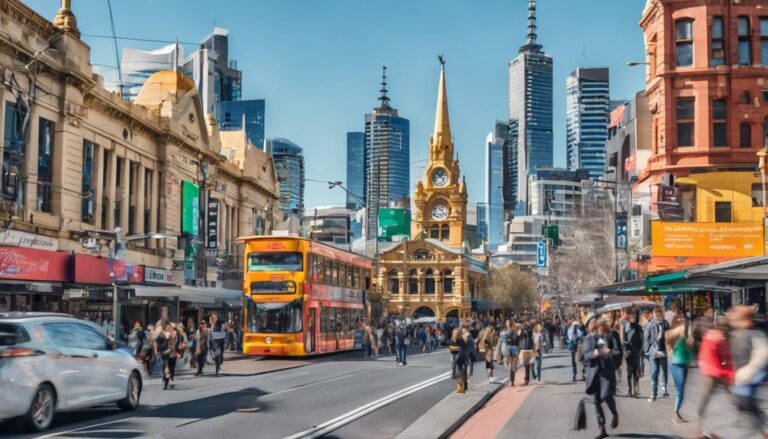To crush your competition in Melbourne, mastering local SEO is vital. I focus on optimizing my Google My Business listing since complete profiles attract seven times more clicks. I also guarantee my website is mobile-friendly and loads quickly, as every second counts. Incorporating local keywords helps me target specific searches like “best coffee shop in Melbourne.”
Building local citations is essential for credibility, and engaging with customer reviews boosts my visibility. Finally, I track performance metrics using tools like Google Analytics. Discovering data-driven strategies can greatly enhance my local SEO efforts and pave the way for success.
Understanding Local SEO

When I immerse myself in understanding Local SEO, it’s essential to grasp its dual focus on search engine optimization and geographic relevance. This concept isn’t just technical jargon; it’s about positioning your business in front of the right audience—those in your local area searching for products or services you offer.
Implementing effective strategies like Google My Business optimization can greatly enhance your local visibility.
The data speaks volumes: 46% of all Google searches are local. If your business isn’t optimized for local searches, you’re missing out on a considerable customer base. Key elements include optimizing your website with local keywords, ensuring your NAP (Name, Address, Phone Number) is consistent across all platforms, and leveraging local backlinks.
Using structured data markup can enhance your visibility in local search results, making it easier for search engines to understand your business.
I’ve found that engaging with local communities, whether through social media or community events, also strengthens your local relevance.
In essence, mastering Local SEO is about connecting with the community and ensuring your business is seen as an accessible option. By understanding these principles, you’ll be better positioned to attract and retain local customers, fostering a sense of belonging in your area.
Importance of Google My Business
In today’s digital landscape, having a well-optimized Google My Business (GMB) profile is essential for local businesses. GMB is often the first touchpoint for potential customers, and statistics show that 46% of all Google searches are looking for local information.
If your business isn’t listed or properly optimized, you might miss out on a significant number of local customers.
By managing your GMB profile effectively, you can showcase crucial information like your address, hours, and services. This not only improves your visibility in local search results but also increases your credibility.
In fact, businesses with complete GMB listings receive 7 times more clicks than those without.
Moreover, GMB allows you to engage with your audience through reviews and Q&A, fostering a sense of community. When you respond to reviews, it shows you value customer feedback and are committed to your local clientele.
Optimizing Your Website

Optimizing your website is essential for improving your local SEO performance. I’ve seen firsthand how small changes can lead to significant results.
First, verify your site is mobile-friendly; over half of all web traffic comes from mobile devices. If your site isn’t responsive, you risk losing potential customers.
Next, improve your site speed. Research shows that a one-second delay can reduce conversions by 7%. Tools like Google PageSpeed Insights can help identify areas for improvement.
Don’t overlook the importance of clear navigation. A well-structured site keeps visitors engaged and reduces bounce rates. Aim for a logical hierarchy in your menu and include a search feature for ease of access.
Make sure to include local elements in your website’s design. Adding your city or region in key areas like headers, footers, and contact pages can signal to search engines that you’re a local business.
Leveraging Local Keywords
Local keywords can greatly boost your visibility in search results, and I’ve seen businesses thrive by incorporating them effectively. By honing in on specific phrases that reflect your location and services, you can attract more relevant traffic to your website.
For instance, instead of just “coffee shop,” using “best coffee shop in Melbourne” targets local customers actively searching for what you offer.
I recommend using tools like Google Keyword Planner or SEMrush to identify the most effective local keywords for your niche. Look for terms with a manageable search volume—this indicates a balance between demand and competition.
I’ve found that focusing on long-tail keywords can yield significant returns, as they often reveal clear intent from potential customers.
Once you’ve pinpointed your local keywords, seamlessly integrate them into your website content, meta descriptions, and headers. This not only enhances your SEO but also makes your content more relatable to your audience.
When locals see that you understand their needs, they’re more likely to engage. Remember, it’s all about creating a connection with your community while optimizing your online presence.
Building Local Citations

Numerous studies highlight the importance of local citations for boosting your business’s online visibility. Local citations, which include mentions of your business name, address, and phone number (NAP) across various online platforms, play an essential role in local SEO.
I’ve found that consistent and accurate citations can greatly improve your ranking in search engine results, helping potential customers find you more easily.
To start building local citations, I recommend identifying reputable online directories relevant to your industry and region. Listing your business on platforms like Google My Business, Yelp, and local chamber of commerce websites can enhance your credibility.
It’s vital to confirm that your NAP information is uniform across all listings; discrepancies can confuse search engines and harm your visibility.
Additionally, consider reaching out to local blogs, news sites, and community boards. They often provide opportunities for features, which can create valuable backlinks to your site.
Encouraging Customer Reviews
A significant number of consumers rely on online reviews when deciding where to spend their money. In fact, studies show that around 84% of people trust online reviews as much as personal recommendations. This data highlights the immense power of customer feedback in shaping your business’s reputation.
To encourage reviews, I recommend creating a seamless experience for your customers. After a purchase, send a follow-up email thanking them and kindly asking for their feedback. Make it easy by providing direct links to review platforms like Google or Yelp.
Incentivizing reviews can also work wonders. Consider implementing a loyalty program that rewards customers for leaving feedback. Just guarantee you’re transparent and ethical—genuine reviews hold more weight than incentivized ones.
Additionally, responding to reviews—both positive and negative—shows you value customer input and fosters a sense of community. Engaging with reviewers can build trust and encourage more people to share their experiences.
Utilizing Social Media

Social media’s influence on businesses can’t be overstated; it’s a powerful tool for enhancing your local SEO strategy. By actively engaging with your audience on platforms like Facebook, Instagram, and Twitter, you not only build a community but also drive traffic to your website.
Data shows that 54% of consumers use social media to research products, which means your presence can greatly impact their purchasing decisions.
To optimize your local SEO, I recommend creating content that resonates with your target audience. Share local news, events, or promotions that showcase your connection to the community. Use location tags and relevant hashtags to increase visibility.
Consistent posting can also improve your brand’s credibility, making it easier for potential customers to trust you.
Additionally, respond promptly to comments and messages. This not only fosters a sense of belonging but also signals to search engines that you’re actively engaging with your audience.
Collaborating with local influencers can further amplify your reach, putting your business in front of a larger audience. By integrating social media into your local SEO efforts, you’re not just promoting your business; you’re building lasting relationships within your community.
Tracking Your Local SEO Performance
Tracking local SEO performance is essential for understanding how well your efforts are paying off. I’ve found that using tools like Google Analytics and Google Search Console gives me invaluable insights into my website’s traffic and user behavior. By monitoring key metrics such as organic search traffic, bounce rates, and conversion rates, I can identify what’s working and what needs improvement.
I also pay close attention to local keyword rankings. Tools like SEMrush or Ahrefs help me track my position for targeted keywords, allowing me to adjust strategies based on performance. If I notice a drop in rankings, I dig deeper to identify potential issues, whether it’s content relevance or backlinks.
Another critical aspect is customer engagement. I track reviews and ratings on platforms like Google My Business, as these directly influence local rankings. Positive reviews can boost visibility, so I encourage satisfied customers to share their experiences.
Lastly, I analyze competitor performance. Understanding their strengths and weaknesses helps me refine my approach. By consistently monitoring these metrics, I can guarantee my local SEO strategy remains effective, driving growth and visibility for my business in Melbourne.
For SEO services in Melbourne, visit Local SEO Melbourne.











